Evangelos Gerovassiliou: In Love with the Vineyard
The Thessaloniki-born winemaker welcomes us to...
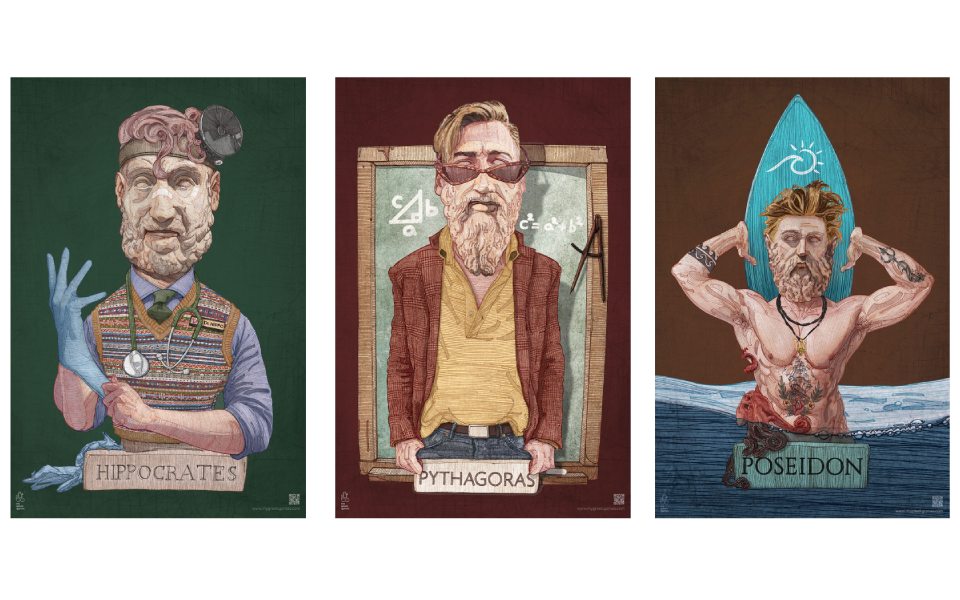
© My Greek Games
Thessaloniki natives and friends for over 20 years Efi Karagouni and Christos Papachristou are the founders of the board game company My Greek Games.
Efi holds a degree in architecture from the Aristotle University of Thessaloniki with postgraduate studies in Wales. Christos has a degree in fine arts from the University of Sunderland, UK. They both love games, art, history, children and, of course, being creative.
They spoke to us about how they launched their company, teaching children fair play through games and their collaboration with the British Museum.

My Greek Games founders Efi Karagouni and Christos Papachristou
© My Greek Games
How difficult is it to conceive of a new game? Is there a method? Is it something you master over time?
To come up with an idea for a game is quite easy; it’s something that can be done by virtually anyone who plays board games and has some knowledge of the basic components of such games. It’s not hard for someone to think they’d like to create a game, say, about Odysseus, Hercules or Zeus, for example. The real difficulty lies in creating the game play, in completing the game. That requires knowledge.
We want our games to be educational, but also entertaining, and combining these two components is something that requires knowledge, study, responsibility and thoughtfulness. Additionally, it is something that requires research regarding the story, the rules, and the way the game will be played.
We always keep in mind that we are catering to children and generally players who will be learning from us. Consequently, we have to be very careful about the information we provide as well as the messages we convey. When the research phase is complete, you have to test the final game play over and over, to see if the game can be played and if it leads where you thought it would; if it’s engaging, if the texts are right, if they convey your message without offending anybody, and whether, ultimately, the game is entertaining.
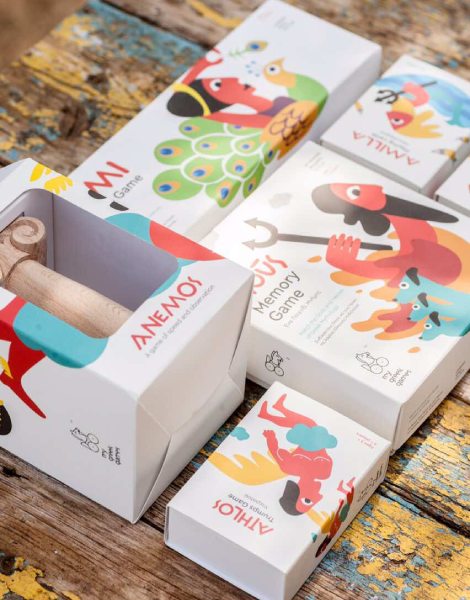
© My Greek Games
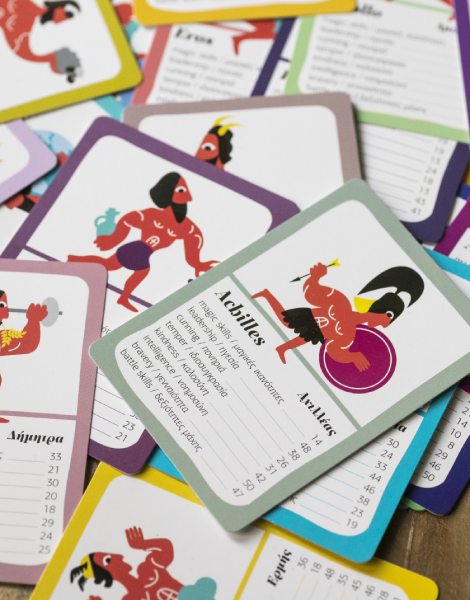
© My Greek Games
Does being two help?
Having two brains and two opinions always helps. Usually one complements the other on every level whether that has to do with the creative aspect or other things, such as the functionality, the economics, and so on. The respect we have for one another and our love for what we do, as well as the good chemistry that we have between us, are the main ingredients of our partnership. We know each other well enough now to understand when one of us needs to let the other take the lead and do what they think is right regarding a product in the making.
Tell us a bit about how you met and how you managed to reach the point where you create games that, from Thessaloniki, are played around the world.
Our story begins many years ago – we have been friends for over 20 years. Since the beginning we’ve had many common interests and a similar way of thinking. We often spoke about doing something together in the future. Then came our studies, our jobs in different areas; yet the urge to create and be artistic never left us. We considered many options regarding what we could do together until one day, the idea of developing board games came up. We instantly knew that it was what we had been looking for all that time.
With enthusiasm, love and a certain amount of audacity, one could say, given that we started during an uncertain and difficult period, we began to develop our plan. Eventually, by the end of 2016, we had completed our first game series.
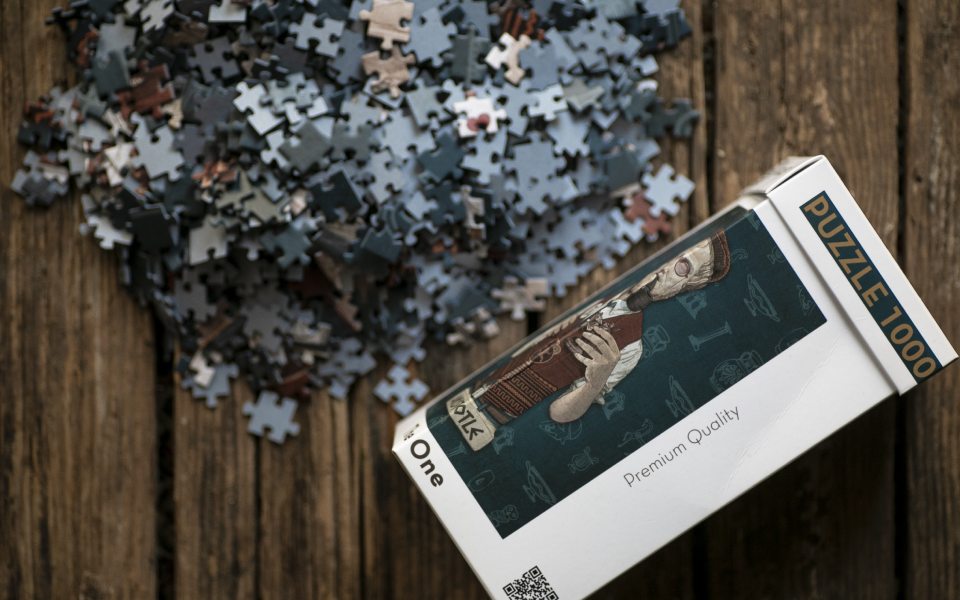
A jigsaw puzzle from My Greek Games
© My Greek Games
Have you been approached to create custom games?
We have been approached a number of times, and it is particularly interesting to us. As a matter of fact, we are preparing a collaboration with both a museum and a major environmental organization. This is confirmation that we are on the right track, and that our work is being well received.
What makes a game special or unique?
Originality, pleasing aesthetics, a high level of quality, content created with care, attention to detail, and love are some of the ingredients of our recipe. For a game to be special, however, the thing it needs the most is magic – that is, a combination of many elements that work together to create a unique game.
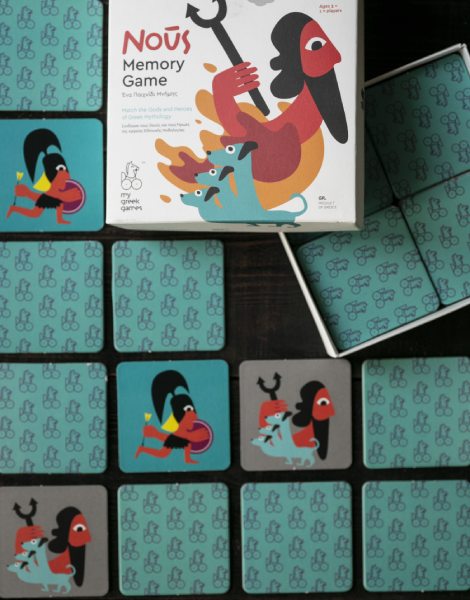
© My Greek Games
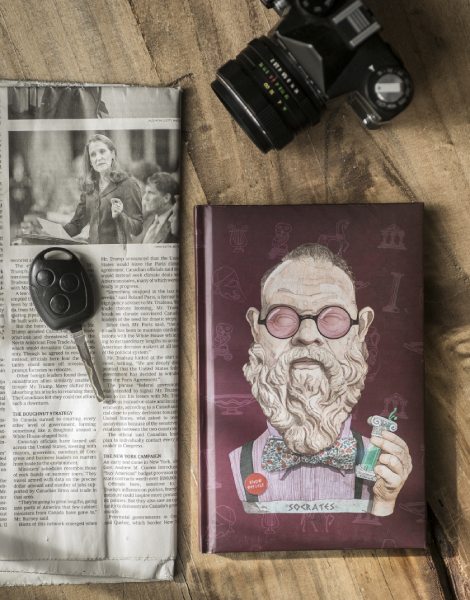
© My Greek Games
Are your games an opportunity for children and adults to learn useful information about Greece?
The games allow them to have a good time, to communicate, and of course to learn about Greece in an indirect and pleasant way. However, aside from the educational aspect, we try to give our games a moral dimension.
For instance we have the Odyssey for example, which is a snakes and ladders game where the player learns about the return of Odysseus to Ithaca. But then there is the Labyrinth, a game that refers to the story of Theseus and the Minotaur but at the same time also addresses the issue of bullying, which is a contemporary phenomenon that affects children.
Which element do you think is dominant in your games, that of competition or a sense of fair play?
Human beings are competitive by nature. After all, it is one of the characteristics that have helped them evolve. In order to be more interesting, board games rely on a spirit of competitiveness, but at the same time teach a sense of fair play. As important as Ithaca may be, it is the journey that matters; likewise it is the game itself that will provide you with knowledge and please your soul.
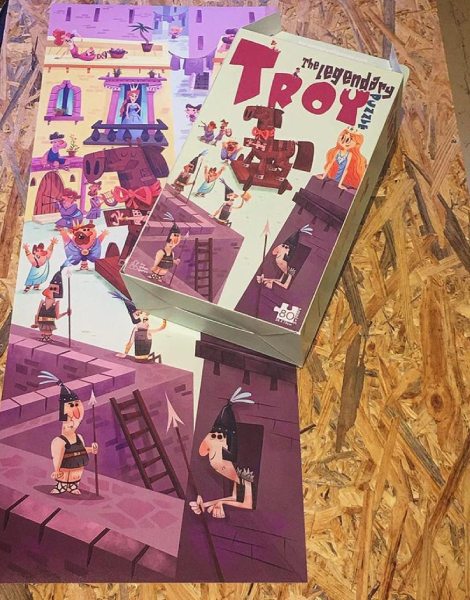
© My Greek Games
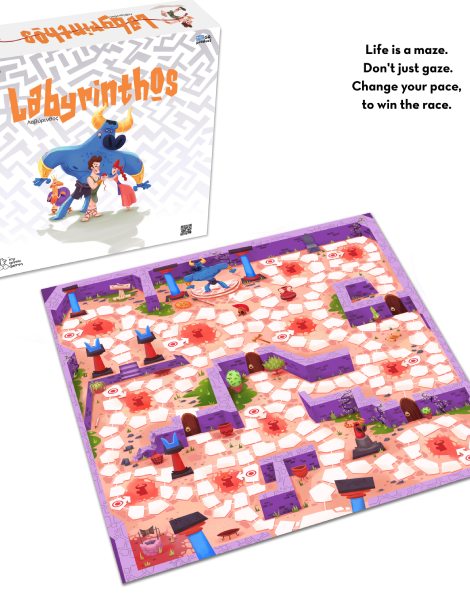
© My Greek Games
How much did your studies in architecture and fine arts help in the creation of the games?
Our studies have helped us mainly with regards to the aesthetic aspect. We provide the idea, and the designs are created by collaborator friends from different backgrounds – artists and illustrators. The image is always related to the game that is being created and the age of our target audience.
For younger ages we tend to go for a more “childish” design with bright colors and simple lines; we also try to convey messages and information as clearly as possible. In the same way, in games aimed at older age groups and adults, the design has a different style, the lines are more complex and the messages are more subtle. The aim is to try to provoke players’ thinking and powers of observation.
For example, in one of our games, Aphrodite, the goddess of beauty, is a particularly attractive woman with a prosthetic limb (her arm). She is an archetype of beauty, who represents the idea that “beauty is everywhere”. She is a contemporary Venus de Milo, who, just like the statue, is missing an arm, and yet remains the ultimate example of beauty and confidence.
My Greek Games can be found at the British Museum. How does it feel to be collaborating with such a major cultural institution? Where else can we find you?
You can find our games at the Benaki Museum, the Museum of Cycladic Art, the Herakleidon Museum, the Museum of Photography, the Industrial Gas Museum and the Museum of Illusions.
The British Museum has featured them in combination with the exhibition “Troy”. The offer to collaborate came as a very pleasant surprise, as the British usually arrange their collaborations one year in advance. However, when the gift shop’s director visited our country, she saw our game series and liked them, and she added them as an extra. When you hear such good words from such a large organization you feel that your labors and efforts have all been worthwhile.
The Thessaloniki-born winemaker welcomes us to...
A journey through Hania’s Venetian past,...
Ten must-do experiences in Athens, from...
From ancient healing sanctuaries to legendary...